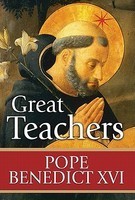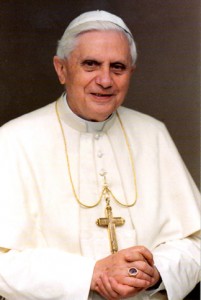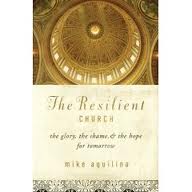Gregory Erlandson, president and publisher of the Our Sunday Visitor Publishing, joins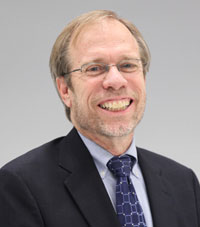 us once again to discuss the tremendous work of our Holy Father, Pope Benedict and his reflections and teachings on “The Great Teachers”. Greg offers fantastic insight on the teachings of Pope Benedict and the need we have for it in the Church today.
us once again to discuss the tremendous work of our Holy Father, Pope Benedict and his reflections and teachings on “The Great Teachers”. Greg offers fantastic insight on the teachings of Pope Benedict and the need we have for it in the Church today.
[powerpress]
“To renew the Church in every age, God raises up saints, who themselves have been renewed by God and are in constant contact with God.” Pope Benedict XVI
Discover the greatest teachers of the Faith as Pope Benedict XVI highlights their essential role during a time of scandal and strife in the Church.
Find the book here
–Hugh and Richard of Saint-Victor
–William of Saint-Thierry
–Rupert of Dutz
–John of Salisbury
–Peter Lombard
–St. Francis of Assisi
–St. Dominic Guzman
–St. Anthony of Padua
–St. Bonaventure
–St. Albert the Great
–St. Thomas Aquinas
–John Duns Scotus
Tags: catholic, catholic podcast, catholic prayer, cathollc spirituality
This entry was posted on Tuesday, May 3rd, 2011 at 1:40 pm
You can follow any responses to this entry through the RSS 2.0 feed.
Philip said to Jesus, “Lord, show us the Father, and we shall be satisfied”
[powerpress feed=”daily-scripture”]
an excerpt from today’s reflection by Don Schwager: 
One of the greatest truths of the Christian faith is that we can know the living God. Our knowledge of God is not simply limited to knowing something about God, but we can know God personally. The essence of Christianity, and what makes it distinct from Judaism and other religions, is the personal knowledge of God as our Father.
Jesus makes it possible for each of us to personally know God as our Father. To see Jesus is to see what God is like. In Jesus we see the perfect love of God – a God who cares intensely and who yearns over men and women, loving them to the point of laying down his life for them upon the Cross. Jesus is the revelation of God – a God who loves us unconditionally – without reservation, unselfishly – for our sake and not his, and perfectly – without neglecting or forgetting us even for a brief moment. Jesus promises that God the Father will hear our prayers when we pray in his name. That is why Jesus taught his followers to pray with confidence, Our Father who art in heaven ..give us this day our daily bread (Matthew 6:9,11; Luke 11:2-3). Do you pray to your Father in heaven with joy and confidence in his love and care for you?
“Lord Jesus, you fill us with the joy of your saving presence and you give us the hope of everlasting life with God our Father in Heaven. Show me the Father that I may know and glorify him always.”
for the full reflection visit : Daily Reading and Meditation
Tags: catholic, catholic podcast, catholic prayer, cathollc spirituality, don schwager, gospel of john
This entry was posted on Tuesday, May 3rd, 2011 at 8:22 am
You can follow any responses to this entry through the RSS 2.0 feed.
“Burst – A Story of God’s Grace When Life Falls Apart” by Kevin Wells is truly inspirational. 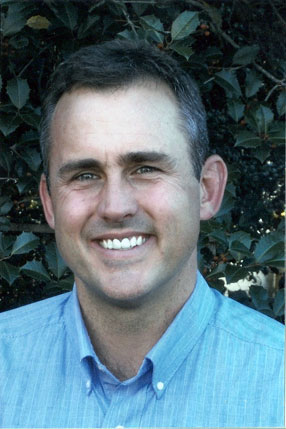 Sharing the traumatic, as well as the heroic moments of life, Kevin Wells helps us to see the grace of God and it’s power to transform our lives. Draw close to God and He’ll draw close to you! Well written, this is a beautiful memoir by a rock solid Catholic man. This is one of those books that just compells you to keep reading. Fantastic!
Sharing the traumatic, as well as the heroic moments of life, Kevin Wells helps us to see the grace of God and it’s power to transform our lives. Draw close to God and He’ll draw close to you! Well written, this is a beautiful memoir by a rock solid Catholic man. This is one of those books that just compells you to keep reading. Fantastic!
 Check out Kevin’s book here
Check out Kevin’s book here
Tags: catholic, catholic podcast, catholic prayer, cathollc spirituality, kevin wells
This entry was posted on Monday, May 2nd, 2011 at 9:07 am
You can follow any responses to this entry through the RSS 2.0 feed.
Episode 8- Regnum Novum: Bringing forth the New Evangelization through Catholic Social Teaching with Omar Guiterrez – Value 5 The Common Good, Universal Destination of Goods, Subsidiarity, Participation, Solidarity part 2
– Value 5 The Common Good, Universal Destination of Goods, Subsidiarity, Participation, Solidarity part 2
[powerpress]
These are the five principles laid out in the Compendium of the Social Doctrine of the Church. If we understand these principles, then the work of the Revolution can begin. We are made now for a New Kingdom with Christ as our King in all things. Let us discover this place together, and make the devil cringe and know the suffering of defeat. “Love”
Discerning Hearts is blessed to present Omar F. A. Guiterrez, M.A. , Special Assistant to Archbishop George Lucas of the Archdiocese of Omaha, in a groundbreaking series which breaks open the heart of Catholic Social Doctrine.
We encourage you to visit “Regnum Novum – A New Kingdom: A Revolution” Omar Guiterrez’s blog site
 We live at a very special time. The confluence of many things has brought forth the clear need to be able to articulate the Social Teaching of the Catholic Church in a way that is accessible and applicable. This is not to be an effort where high-minded theories are to be bandied about. Rather, this is a time of opportunity wherein we can apply the Social Doctrine to the concrete so as to bring about a New Kingdom, a Revolution. – Omar G. from Regnum Novum
We live at a very special time. The confluence of many things has brought forth the clear need to be able to articulate the Social Teaching of the Catholic Church in a way that is accessible and applicable. This is not to be an effort where high-minded theories are to be bandied about. Rather, this is a time of opportunity wherein we can apply the Social Doctrine to the concrete so as to bring about a New Kingdom, a Revolution. – Omar G. from Regnum Novum
From episode 8… Point 5: The Common Good, Universal Destination of Goods, Subsidiarity, Participation, Solidarity
These are the five principles laid out in the Compendium of the Social Doctrine of the Church. If we understand these principles, then the work of the Revolution can begin. We are made now for a New Kingdom with Christ as our King in all things. Let us discover this place together, and make the devil cringe and know the suffering of defeat.
In this episode we focus on “The Universal Destination of Goods”.
Also visit Omar’s “Discerning Hearts” page Catholic Social Teaching 101
Tags: catholic, catholic podcast, catholic prayer, catholic social doctrine, catholic social teaching, cathollc spirituality, compendium of the social doctrine of the church, new evangelization, Omar Guiterrez, social teaching of the catholic church
This entry was posted on Monday, May 2nd, 2011 at 4:46 am
You can follow any responses to this entry through the RSS 2.0 feed.
“Unless one is born anew, he cannot see the kingdom of God“
[powerpress feed=”daily-scripture”]
an excerpt from today’s reflection by Don Schwager: 
Do you nourish your faith with prayerful reflection of the word of God? When Nicodemus heard about Jesus’ miracles and extraordinary teaching, he decided to meet with him privately, away from the crowds and the public spotlight. Nicodemus was no ordinary Jew. He was a religious ruler and member of the Sanhedrin, which was the supreme court of the Jews, and a teacher of Israel (John 3:10). He was a devout Pharisee who sought to perfectly follow the law of Moses, as prescribed in the Five Books of Moses (Genesis, Exodus, Deuteronomy, Leviticus, and Numbers) and further elaborated in the numerous scribal laws, recorded in the Mishnah and the Talmud. Nicodemus decided to meet with Jesus at night, possibly for two reasons. He may have been cautious and not ready to publicly associate himself with Jesus since many Pharisees opposed Jesus’ teaching and called him a Sabbath breaker. It is also likely that Nicodemus chose the night as the best time for seeking a private and undisturbed conversation with Jesus. The rabbis declared that the best time to study the law was at night after the day’s work was completed and the household was at rest. When Nicodemus saw Jesus he called him addressed him as a rabbi and teacher who came from God.
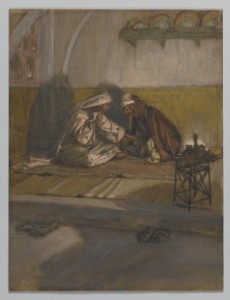 Jesus’ conversation with Nicodemus went to the very heart of the Mosaic law – how can one get right with God and enter God’s kingdom? Jesus’ answer brief and startling: “Unless one is born anew, he cannot see God.” The new birth which Jesus spoke about was not a physical birth but the beginning of a spiritual birth which is something completly new and radical, and from above, namely from God himself. Jesus said that rebirth was necessary to enter the kingdom of God. Nicodemus thought that to be born again, even spiritually, was impossible. He probably knew too well from experience that anyone who wants to be changed, can’t change himself. Jesus explained that this change could only come about through the work and action of the Holy Spirit. This rebirth in the Spirit is real and experiential, like the wind which can be heard and felt but no seen by the naked eye.
Jesus’ conversation with Nicodemus went to the very heart of the Mosaic law – how can one get right with God and enter God’s kingdom? Jesus’ answer brief and startling: “Unless one is born anew, he cannot see God.” The new birth which Jesus spoke about was not a physical birth but the beginning of a spiritual birth which is something completly new and radical, and from above, namely from God himself. Jesus said that rebirth was necessary to enter the kingdom of God. Nicodemus thought that to be born again, even spiritually, was impossible. He probably knew too well from experience that anyone who wants to be changed, can’t change himself. Jesus explained that this change could only come about through the work and action of the Holy Spirit. This rebirth in the Spirit is real and experiential, like the wind which can be heard and felt but no seen by the naked eye.
What does it mean to be reborn in the Spirit? The new birth Jesus speaks of is a spiritual birth to new life and relationship with God as his sons and daughters. This new birth is made possible when one is baptized into Christ and receives the gift of the Holy Spirit. God wants to renew all his people in the gift of new life in his Holy Spirit. This new life brings us into God’s kingdom and heavenly way of life. What is God’s kingdom? God’s kingdom is that society of men and women who acknowledge God as their Lord and who live according to his will, both on earth and in heaven (Matthew 6:10). To be reborn is to enter that society in which God is honored and obeyed, to live as his sons and daughters, and to enter into possession of that life which comes from God himself, a never-ending life of love, peace, joy, and freedom from sin and the fear of death. Do you know the joy and freedom of new life in Jesus Christ?
“Lord Jesus Christ, you offer us a new birth in the Holy Spirit. Renew in me the gift of faith and new life in your Holy Spirit. Help me to draw near to you and to believe in your life-giving word. May your kingdom come and may your will be done in my life today and always.”
for the full reflection visit : Daily Reading and Meditation
Tags: catholic, catholic podcast, catholic prayer, cathollc spirituality, don schwager, gospel of john, Nicodemus
This entry was posted on Monday, May 2nd, 2011 at 12:10 am
You can follow any responses to this entry through the RSS 2.0 feed.
Episode 3 – The Case for Christianity
The Resilient Church with Mike Aquilina, offers a fascinating look at the trials and triumphs of the Catholic Church over the past two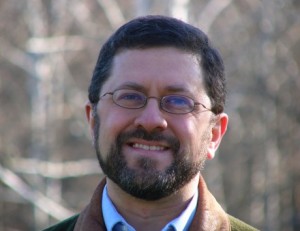 thousand years. Fast-paced sketches of critical periods in church history give readers perspective on the challenges faced by the church today. Mike Aquilina does not shrink from the realities of the past, including badly behaved leaders and those who betrayed the Lord. Yet he also leaves us all with well-founded hope for the future: God remains faithful in every circumstance and fulfills his promise to remain with his church always. Hosted by Kris McGregor
thousand years. Fast-paced sketches of critical periods in church history give readers perspective on the challenges faced by the church today. Mike Aquilina does not shrink from the realities of the past, including badly behaved leaders and those who betrayed the Lord. Yet he also leaves us all with well-founded hope for the future: God remains faithful in every circumstance and fulfills his promise to remain with his church always. Hosted by Kris McGregor
Also visit Mike’s “Discerning Hearts†page for more audio downloads and information!
Tags: catholic, catholic podcast, catholic prayer, cathollc spirituality, church history, mike aquilina, Resilient Church, st. paul center for biblical theology
This entry was posted on Sunday, May 1st, 2011 at 6:24 pm
You can follow any responses to this entry through the RSS 2.0 feed.
Here is Pope Benedict XVI’s homily for the Mass of beatification:
Dear Brothers and Sisters,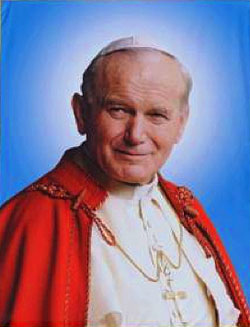
Six years ago we gathered in this Square to celebrate the funeral of Pope John Paul II. Our grief at his loss was deep, but even greater was our sense of an immense grace which embraced Rome and the whole world: a grace which was in some way the fruit of my beloved predecessor’s entire life, and especially of his witness in suffering. Even then we perceived the fragrance of his sanctity, and in any number of ways God’s People showed their veneration for him. For this reason, with all due respect for the Church’s canonical norms, I wanted his cause of beatification to move forward with reasonable haste. And now the longed-for day has come; it came quickly because this is what was pleasing to the Lord: John Paul II is blessed!
I would like to offer a cordial greeting to all of you who on this happy occasion have come in such great numbers to Rome from all over the world – cardinals, patriarchs of the Eastern Catholic Churches, brother bishops and priests, official delegations, ambassadors and civil authorities, consecrated men and women and lay faithful, and I extend that greeting to all those who join us by radio and television.
Today is the Second Sunday of Easter, which Blessed John Paul II entitled Divine Mercy Sunday. The date was chosen for today’s celebration because, in God’s providence, my predecessor died on the vigil of this feast. Today is also the first day of May, Mary’s month, and the liturgical memorial of Saint Joseph the Worker. All these elements serve to enrich our prayer, they help us in our pilgrimage through time and space; but in heaven a very different celebration is taking place among the angels and saints! Even so, God is but one, and one too is Christ the Lord, who like a bridge joins earth to heaven. At this moment we feel closer than ever, sharing as it were in the liturgy of heaven.
“Blessed are those who have not seen and yet have come to believe” (Jn 20:29). In today’s Gospel Jesus proclaims this beatitude: the beatitude of faith. For us, it is particularly striking because we are gathered to celebrate a beatification, but even more so because today the one proclaimed blessed is a Pope, a Successor of Peter, one who was called to confirm his brethren in the faith. John Paul II is blessed because of his faith, a strong, generous and apostolic faith. We think at once of another beatitude: “Blessed are you, Simon, son of Jonah! For flesh and blood has not revealed this to you, but my Father in heaven” (Mt 16:17). What did our heavenly Father reveal to Simon? That Jesus is the Christ, the Son of the living God. Because of this faith, Simon becomes Peter, the rock on which Jesus can build his Church. The eternal beatitude of John Paul II, which today the Church rejoices to proclaim, is wholly contained in these sayings of Jesus: “Blessed are you, Simon” and “Blessed are those who have not seen and yet have come to believe!” It is the beatitude of faith, which John Paul II also received as a gift from God the Father for the building up of Christ’s Church.
Our thoughts turn to yet another beatitude, one which appears in the Gospel before all others. It is the beatitude of the Virgin Mary, the Mother of the Redeemer. Mary, who had just conceived Jesus, was told by Saint Elizabeth: “Blessed is she who believed that there would be a fulfilment of what was spoken to her by the Lord” (Lk 1:45). The beatitude of faith has its model in Mary, and all of us rejoice that the beatification of John Paul II takes place on this first day of the month of Mary, beneath the maternal gaze of the one who by her faith sustained the faith of the Apostles and constantly sustains the faith of their successors, especially those called to occupy the Chair of Peter. Mary does not appear in the accounts of Christ’s resurrection, yet hers is, as it were, a continual, hidden presence: she is the Mother to whom Jesus entrusted each of his disciples and the entire community. In particular we can see how Saint John and Saint Luke record the powerful, maternal presence of Mary in the passages preceding those read in today’s Gospel and first reading. In the account of Jesus’ death, Mary appears at the foot of the cross (Jn 19:25), and at the beginning of the Acts of the Apostles she is seen in the midst of the disciples gathered in prayer in the Upper Room (Acts 1:14).
Today’s second reading also speaks to us of faith. Saint Peter himself, filled with spiritual enthusiasm, points out to the newly-baptized the reason for their hope and their joy. I like to think how in this passage, at the beginning of his First Letter, Peter does not use language of exhortation; instead, he states a fact. He writes: “you rejoice”, and he adds: “you love him; and even though you do not see him now, you believe in him and rejoice with an indescribable and glorious joy, for you are receiving the outcome of your faith, the salvation of your souls” (1 Pet 1:6, 8-9). All these verbs are in the indicative, because a new reality has come about in Christ’s resurrection, a reality to which faith opens the door. “This is the Lord’s doing”, says the Psalm (118:23), and “it is marvelous in our eyes”, the eyes of faith.
Dear brothers and sisters, today our eyes behold, in the full spiritual light of the Risen Christ, the beloved and revered figure of John Paul II. Today his name is added to the host of those whom he proclaimed saints and blesseds during the almost twenty-seven years of his pontificate, thereby forcefully emphasizing the universal vocation to the heights of the Christian life, to holiness, taught by the conciliar Constitution on the Church Lumen Gentium. All of us, as members of the people of God – bishops, priests, deacons, laity, men and women religious – are making our pilgrim way to the heavenly homeland where the Virgin Mary has preceded us, associated as she was in a unique and perfect way to the mystery of Christ and the Church. Karol WojtyÅ‚a took part in the Second Vatican Council, first as an auxiliary Bishop and then as Archbishop of Kraków. He was fully aware that the Council’s decision to devote the last chapter of its Constitution on the Church to Mary meant that the Mother of the Redeemer is held up as an image and model of holiness for every Christian and for the entire Church. This was the theological vision which Blessed John Paul II discovered as a young man and subsequently maintained and deepened throughout his life. A vision which is expressed in the scriptural image of the crucified Christ with Mary, his Mother, at his side. This icon from the Gospel of John (19:25-27) was taken up in the episcopal and later the papal coat-of-arms of Karol WojtyÅ‚a: a golden cross with the letter “M” on the lower right and the motto “Totus tuus”, drawn from the well-known words of Saint Louis Marie Grignion de Montfort in which Karol WojtyÅ‚a found a guiding light for his life: “Totus tuus ego sum et omnia mea tua sunt. Accipio te in mea omnia. Praebe mihi cor tuum, Maria – I belong entirely to you, and all that I have is yours. I take you for my all. O Mary, give me your heart” (Treatise on True Devotion to the Blessed Virgin, 266).
In his Testament, the new Blessed wrote: “When, on 16 October 1978, the Conclave of Cardinals chose John Paul II, the Primate of Poland, Cardinal Stefan WyszyÅ„ski, said to me: ‘The task of the new Pope will be to lead the Church into the Third Millennium'”. And the Pope added: “I would like once again to express my gratitude to the Holy Spirit for the great gift of the Second Vatican Council, to which, together with the whole Church – and especially with the whole episcopate – I feel indebted. I am convinced that it will long be granted to the new generations to draw from the treasures that this Council of the twentieth century has lavished upon us. As a Bishop who took part in the Council from the first to the last day, I desire to entrust this great patrimony to all who are and will be called in the future to put it into practice. For my part, I thank the Eternal Shepherd, who has enabled me to serve this very great cause in the course of all the years of my Pontificate”. And what is this “cause”? It is the same one that John Paul II presented during his first solemn Mass in Saint Peter’s Square in the unforgettable words: “Do not be afraid! Open, open wide the doors to Christ!” What the newly-elected Pope asked of everyone, he was himself the first to do: society, culture, political and economic systems he opened up to Christ, turning back with the strength of a titan – a strength which came to him from God – a tide which appeared irreversible. By his witness of faith, love and apostolic courage, accompanied by great human charisma, this exemplary son of Poland helped believers throughout the world not to be afraid to be called Christian, to belong to the Church, to speak of the Gospel. In a word: he helped us not to fear the truth, because truth is the guarantee of liberty. To put it even more succinctly: he gave us the strength to believe in Christ, because Christ is Redemptor hominis, the Redeemer of man. This was the theme of his first encyclical, and the thread which runs though all the others.
When Karol WojtyÅ‚a ascended to the throne of Peter, he brought with him a deep understanding of the difference between Marxism and Christianity, based on their respective visions of man. This was his message: man is the way of the Church, and Christ is the way of man. With this message, which is the great legacy of the Second Vatican Council and of its “helmsman”, the Servant of God Pope Paul VI, John Paul II led the People of God across the threshold of the Third Millennium, which thanks to Christ he was able to call “the threshold of hope”. Throughout the long journey of preparation for the great Jubilee he directed Christianity once again to the future, the future of God, which transcends history while nonetheless directly affecting it. He rightly reclaimed for Christianity that impulse of hope which had in some sense faltered before Marxism and the ideology of progress. He restored to Christianity its true face as a religion of hope, to be lived in history in an “Advent” spirit, in a personal and communitarian existence directed to Christ, the fullness of humanity and the fulfillment of all our longings for justice and peace.
Finally, on a more personal note, I would like to thank God for the gift of having worked for many years with Blessed Pope John Paul II. I had known him earlier and had esteemed him, but for twenty-three years, beginning in 1982 after he called me to Rome to be Prefect of the Congregation for the Doctrine of the Faith, I was at his side and came to revere him all the more. My own service was sustained by his spiritual depth and by the richness of his insights. His example of prayer continually impressed and edified me: he remained deeply united to God even amid the many demands of his ministry. Then too, there was his witness in suffering: the Lord gradually stripped him of everything, yet he remained ever a “rock”, as Christ desired. His profound humility, grounded in close union with Christ, enabled him to continue to lead the Church and to give to the world a message which became all the more eloquent as his physical strength declined. In this way he lived out in an extraordinary way the vocation of every priest and bishop to become completely one with Jesus, whom he daily receives and offers in the Church.
Blessed are you, beloved Pope John Paul II, because you believed! Continue, we implore you, to sustain from heaven the faith of God’s people. You often blessed us in this Square from the Apostolic Palace: Bless us, Holy Father! Amen.
Tags: blessed john paul, catholic, catholic podcast, catholic prayer, cathollc spirituality, homily for blessed john paul
This entry was posted on Sunday, May 1st, 2011 at 1:12 pm
You can follow any responses to this entry through the RSS 2.0 feed.
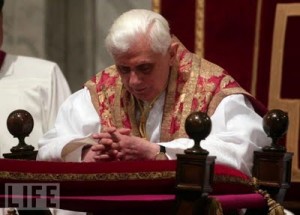 General Intention: That those who work in the media may always respect truth, solidarity and the dignity of each person.
General Intention: That those who work in the media may always respect truth, solidarity and the dignity of each person.
Missionary Intention: That the Lord may grant the Church in China the capacity to persevere in fidelity to the Gospel and to grow in unity.
Tags: catholic, catholic podcast, catholic prayer, cathollc spirituality, Missionary Intention, Prayer Intentions
This entry was posted on Sunday, May 1st, 2011 at 10:23 am
You can follow any responses to this entry through the RSS 2.0 feed.
“After this Jesus revealed himself again to the disciples by the Sea of Tibe’ri-as“
[powerpress feed=”daily-scripture”]
an excerpt from today’s reflection by Don Schwager: 
Aren’t we like the apostles? We wont believe unless we can see with our own eyes. The gospels attest to the reality of the resurrection. Jesus goes to great lengths to assure his disciples that he is no mere ghost or illusion. He shows them the marks of his crucifixion and he explains how the scriptures foretold his death and rising. Jerome, an early church bible scholar, comments: “As he showed them real hands and a real side, he really ate with his disciples; really walked with Cleophas; conversed with men with a real tongue; really reclined at supper; with real hands took bread, blessed and broke it, and was offering it to them. ..Do not put the power of the Lord on the level with the tricks of magicians, so that he may appear to have been what he was not, and may be thought to have eaten without teeth, walked without feet, broken bread without hands, spoken without a tongue, and showed a side which had no ribs.” (From a letter to Pammachius against John of Jerusalem 34, 5th century)
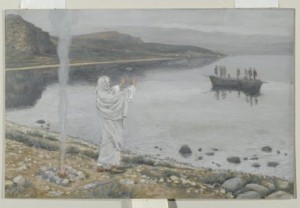 The centrality of the gospel is the cross; but fortunately it does not stop there. Through the cross Jesus defeated our enemies – death and Satan and won pardon for our sins. His cross is the door to heaven and the key to paradise. The way to glory is through the cross. When the disciples saw the risen Lord they disbelieved for joy! How can death lead to life, the cross to victory? Jesus shows us the way and he gives us the power to overcome sin and despair, and everything else that would stand in the way of his love and truth. Just as the first disciples were commissioned to bring the good news of salvation to all the nations, so, we, too, are called to be witnesses of the resurrection of Jesus Christ to all who live on the face of the earth. Do you witness the joy of the gospel to those around you?
The centrality of the gospel is the cross; but fortunately it does not stop there. Through the cross Jesus defeated our enemies – death and Satan and won pardon for our sins. His cross is the door to heaven and the key to paradise. The way to glory is through the cross. When the disciples saw the risen Lord they disbelieved for joy! How can death lead to life, the cross to victory? Jesus shows us the way and he gives us the power to overcome sin and despair, and everything else that would stand in the way of his love and truth. Just as the first disciples were commissioned to bring the good news of salvation to all the nations, so, we, too, are called to be witnesses of the resurrection of Jesus Christ to all who live on the face of the earth. Do you witness the joy of the gospel to those around you?
“Lord Jesus, open our minds to understand the scriptures that we may fully comprehend the truth of your word. Anoint us with your power and give us boldness to proclaim the gospel in word and deed.”
for the full reflection visit : Daily Reading and Meditation
Tags: catholic, catholic podcast, catholic prayer, cathollc spirituality, don schwager, gospel of john
This entry was posted on Friday, April 29th, 2011 at 12:04 am
You can follow any responses to this entry through the RSS 2.0 feed.
Episode 17 -The Way of Mystery: The Eucharist and Moral Living – Mystical experiences and consoling prayer. Prayer is earnestly desired, and prayer because something we delight in. Also the prayer that will spontaneously occur. Another type of experience is the aspect of the sacramental encounter.
– Mystical experiences and consoling prayer. Prayer is earnestly desired, and prayer because something we delight in. Also the prayer that will spontaneously occur. Another type of experience is the aspect of the sacramental encounter.
[powerpress]
Deacon James Keating, PhD, the director of Theological Formation for the Institute for Priestly Formation, located at Creighton University, in Omaha, is making available to â€Discerning Hearts†and all who listen, his series of programs entitled “The Way of Mysteryâ€.
 The Vatican II documents remind us that the spiritual journey is not made in a vacuum, that God has chosen to save us, not individually, but as The People of God. The Eucharist must help Christians to make their choices by discerning out of Christ’s paschal mystery. For this process to take place, however, Christians must first understand how the Eucharist puts them in touch with Christ’s passion, death, and resurrection, and what concrete implications being in touch with this mystery has for their daily lives.
The Vatican II documents remind us that the spiritual journey is not made in a vacuum, that God has chosen to save us, not individually, but as The People of God. The Eucharist must help Christians to make their choices by discerning out of Christ’s paschal mystery. For this process to take place, however, Christians must first understand how the Eucharist puts them in touch with Christ’s passion, death, and resurrection, and what concrete implications being in touch with this mystery has for their daily lives.
For more information on the “Institute of Priestly Formation†and for other material available by Deacon Keating, just click here
Don’t forget to pickup a copy of “Communion with Christ†, it is one of the best audio sets on prayer…ever!
Check out Deacon Keating’s “Discerning Heart†page
Tags: catholic, catholic podcast, catholic prayer, cathollc spirituality, creighton university, Deacon James Keating, institute for priestly formation, james keating, the eucharist, theological formation, way of mystery
This entry was posted on Thursday, April 28th, 2011 at 6:51 pm
You can follow any responses to this entry through the RSS 2.0 feed.
“Jesus opened their minds to understand the scriptures”“
[powerpress feed=”daily-scripture”]
an excerpt from today’s reflection by Don Schwager: 
Aren’t we like the apostles? We wont believe unless we can see with our own eyes. The gospels attest to the reality of the resurrection. Jesus goes to great lengths to assure his disciples that he is no mere ghost or illusion. He shows them the marks of his crucifixion and he explains how the scriptures foretold his death and rising. Jerome, an early church bible scholar, comments: “As he showed them real hands and a real side, he really ate with his disciples; really walked with Cleophas; conversed with men with a real tongue; really reclined at supper; with real hands took bread, blessed and broke it, and was offering it to them. ..Do not put the power of the Lord on the level with the tricks of magicians, so that he may appear to have been what he was not, and may be thought to have eaten without teeth, walked without feet, broken bread without hands, spoken without a tongue, and showed a side which had no ribs.” (From a letter to Pammachius against John of Jerusalem 34, 5th century)
The centrality of the gospel is the cross; but fortunately it does not stop there. Through the cross Jesus defeated our enemies – death and Satan and won pardon for our sins. His cross is the door to heaven and the key to paradise. The way to glory is through the cross. When the disciples saw the risen Lord they disbelieved for joy! How can death lead to life, the cross to victory? Jesus shows us the way and he gives us the power to overcome sin and despair, and everything else that would stand in the way of his love and truth. Just as the first disciples were commissioned to bring the good news of salvation to all the nations, so, we, too, are called to be witnesses of the resurrection of Jesus Christ to all who live on the face of the earth. Do you witness the joy of the gospel to those around you?
“Lord Jesus, open our minds to understand the scriptures that we may fully comprehend the truth of your word. Anoint us with your power and give us boldness to proclaim the gospel in word and deed.”
for the full reflection visit : Daily Reading and Meditation
Tags: catholic, catholic podcast, catholic prayer, cathollc spirituality, don schwager, gospel of luke
This entry was posted on Thursday, April 28th, 2011 at 12:05 am
You can follow any responses to this entry through the RSS 2.0 feed.
“Did not our hearts burn while he opened to us the scriptures”
[powerpress feed=”daily-scripture”]
an excerpt from today’s reflection by Don Schwager: 
Why was it difficult for the disciples to recognize the risen Lord? Jesus’ death scattered his disciples and shattered their hopes and dreams. They had hoped that he was the one to redeem Israel. They saw the cross as defeat and could not comprehend the empty tomb until the Lord appeared to them and gave them understanding. Jesus chided the disciples on the road to Emmaus for their slowness of heart to believe what the scriptures had said concerning the Messiah. They did not recognize the risen Jesus until he had broken bread with them. Do you recognize the Lord in his word and in the breaking of the bread?
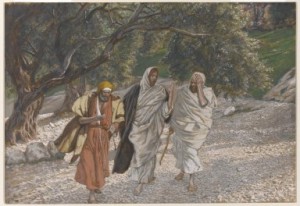 St. Augustine of Hippo (5th century) reflects on the dimness of their perception: “They were so disturbed when they saw him hanging on the cross that they forgot his teaching, did not look for his resurrection, and failed to keep his promises in mind” (Sermon 235.1). “Their eyes were obstructed, that they should not recognize him until the breaking of the bread. And thus, in accordance with the state of their minds, which was still ignorant of the truth (that the Christ would die and rise again”, their eyes were similarly hindered. It was not that the truth himself was misleading them, but rather that they were themselves unable to perceive the truth.” (From The Harmony of the Gospels, 3.25.72) How often do we fail to recognize the Lord when he speaks to our hearts and opens his mind to us? The Risen Lord is ever ready to speak his word to us and to give us understanding of his ways. Do you listen attentively to the Word of God and allow his word to change and transform you?
St. Augustine of Hippo (5th century) reflects on the dimness of their perception: “They were so disturbed when they saw him hanging on the cross that they forgot his teaching, did not look for his resurrection, and failed to keep his promises in mind” (Sermon 235.1). “Their eyes were obstructed, that they should not recognize him until the breaking of the bread. And thus, in accordance with the state of their minds, which was still ignorant of the truth (that the Christ would die and rise again”, their eyes were similarly hindered. It was not that the truth himself was misleading them, but rather that they were themselves unable to perceive the truth.” (From The Harmony of the Gospels, 3.25.72) How often do we fail to recognize the Lord when he speaks to our hearts and opens his mind to us? The Risen Lord is ever ready to speak his word to us and to give us understanding of his ways. Do you listen attentively to the Word of God and allow his word to change and transform you?
“Lord Jesus Christ, open the eyes of my heart to recognize your presence with me and to understand the truth of your saving word. Nourish me with your life-giving word and with the bread of life.”
for the full reflection visit : Daily Reading and Meditation
Tags: catholic, catholic podcast, catholic prayer, cathollc spirituality
This entry was posted on Wednesday, April 27th, 2011 at 12:01 am
You can follow any responses to this entry through the RSS 2.0 feed.
“I have seen the Lord!”
[powerpress feed=”daily-scripture”]
an excerpt from today’s reflection by Don Schwager: 
How easy it is to miss the Lord when our focus is on ourselves! Mary did not at first recognize the Lord because her focus was on the empty tomb and on her own grief. It took only one word from the Master, when he called her by name, for Mary to recognize him. Mary’s message to the disciples, I have seen the Lord, is the very essence of Christianity. It is not enough that a Christian know about the Lord, but 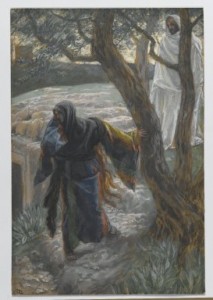 that we know him personally. It is not enough to argue about him, but to meet him. In the resurrection we encounter the living Lord who loves us personally and shares his glory with us. The Lord gives us “eyes of faith” to see the truth of his resurrection and victory over sin and death (Ephesians 1:18).
that we know him personally. It is not enough to argue about him, but to meet him. In the resurrection we encounter the living Lord who loves us personally and shares his glory with us. The Lord gives us “eyes of faith” to see the truth of his resurrection and victory over sin and death (Ephesians 1:18).
The resurrection of Jesus is the foundation of our hope – the hope that we will see God face to face and share in his everlasting glory and joy. “Without having seen him you love him; though you do not now see him you believe in him and rejoice with unutterable and exalted joy. As the outcome of your faith you obtain the salvation of your souls” (1 Peter 1:8-9). Do you recognize the Lord’s presence with you, in his word, in the “breaking of the bread”, and in his church, the body of Christ?
“Lord Jesus, may I never fail to recognize your voice nor lose sight of your presence in your saving word.”
for the full reflection visit : Daily Reading and Meditation
Tags: catholic, catholic podcast, catholic prayer, cathollc spirituality, don schwager, gospel of john
This entry was posted on Tuesday, April 26th, 2011 at 10:13 am
You can follow any responses to this entry through the RSS 2.0 feed.
Episode 7 – Regnum Novum: Bringing forth the New Evangelization through Catholic Social Teaching with Omar Guiterrez – Value 5 The Common Good, Universal Destination of Goods, Subsidiarity, Participation, Solidarity part 1
– Value 5 The Common Good, Universal Destination of Goods, Subsidiarity, Participation, Solidarity part 1
[powerpress]
These are the five principles laid out in the Compendium of the Social Doctrine of the Church. If we understand these principles, then the work of the Revolution can begin. We are made now for a New Kingdom with Christ as our King in all things. Let us discover this place together, and make the devil cringe and know the suffering of defeat. “Love”
Discerning Hearts is blessed to present Omar F. A. Guiterrez, M.A. , Special Assistant to Archbishop George Lucas of the Archdiocese of Omaha, in a groundbreaking series which breaks open the heart of Catholic Social Doctrine.
We encourage you to visit “Regnum Novum – A New Kingdom: A Revolution” Omar Guiterrez’s blog site
 We live at a very special time. The confluence of many things has brought forth the clear need to be able to articulate the Social Teaching of the Catholic Church in a way that is accessible and applicable. This is not to be an effort where high-minded theories are to be bandied about. Rather, this is a time of opportunity wherein we can apply the Social Doctrine to the concrete so as to bring about a New Kingdom, a Revolution. – Omar G. from Regnum Novum
We live at a very special time. The confluence of many things has brought forth the clear need to be able to articulate the Social Teaching of the Catholic Church in a way that is accessible and applicable. This is not to be an effort where high-minded theories are to be bandied about. Rather, this is a time of opportunity wherein we can apply the Social Doctrine to the concrete so as to bring about a New Kingdom, a Revolution. – Omar G. from Regnum Novum
From episode 7… Point 5: The Common Good, Universal Destination of Goods, Subsidiarity, Participation, Solidarity
These are the five principles laid out in the Compendium of the Social Doctrine of the Church. If we understand these principles, then the work of the Revolution can begin. We are made now for a New Kingdom with Christ as our King in all things. Let us discover this place together, and make the devil cringe and know the suffering of defeat.
In this episode we focus on “The Common Good”.
Also visit Omar’s “Discerning Hearts” page Catholic Social Teaching 101
Tags: archdiocese of omaha, catholic, catholic podcast, catholic prayer, catholic social doctrine, cathollc spirituality, common good, compendium of the social doctrine of the church, new evangelization, social teaching of the catholic church
This entry was posted on Monday, April 25th, 2011 at 10:23 am
You can follow any responses to this entry through the RSS 2.0 feed.
“News of the resurrection“
[powerpress feed=”daily-scripture”]
an excerpt from today’s reflection by Don Schwager: 
Are you prepared to meet the Risen Lord? The disciples of Jesus were as unprepared for his resurrection as they were for his death. The empty tomb made them fearful and joyful at the same time. “Where did they put the body or did he really rise just as he predicted?” Even though Jesus had spoken to them before of his death and rising, they could not believe until they saw the empty tomb and met the risen Lord. Aren’t we the same? We want to see with our own eyes before we believe! The guards brought their testimony to the chief priests and elders who met the news with denial. They were resolved to not believe that Jesus had risen and they bribed the guards in the hope of keeping others from believing.
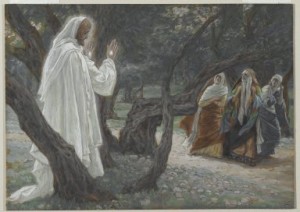 What is the basis of our faith in the resurrection? The scriptures tell us that “faith is the assurance of things hoped for, the conviction of things not seen”(Hebrews 11:1). Faith is an entirely free gift that God makes to us. Our faith is a free assent to the whole truth which God reveals to us through his word. Faith is certain because it is based on the very word of God who cannot lie. Faith also seeks understanding. That is why God enlightens the “eyes of our hearts” that we may know what is the hope to which he has called us (Ephesians 1:18). Peter the Apostle says we have been born anew to a living hope through the resurrection of Jesus Christ from the dead (1 Peter 1:3). Through the gift of faith, the Lord reveals himself to those who believe in his word and he fills them with “new life in his Holy Spirit”. Do you live in the joy and hope of the resurrection? And do you recognize the presence of the Risen Lord in his word, in the “breaking of the bread”, and in his church, the body of Christ?
What is the basis of our faith in the resurrection? The scriptures tell us that “faith is the assurance of things hoped for, the conviction of things not seen”(Hebrews 11:1). Faith is an entirely free gift that God makes to us. Our faith is a free assent to the whole truth which God reveals to us through his word. Faith is certain because it is based on the very word of God who cannot lie. Faith also seeks understanding. That is why God enlightens the “eyes of our hearts” that we may know what is the hope to which he has called us (Ephesians 1:18). Peter the Apostle says we have been born anew to a living hope through the resurrection of Jesus Christ from the dead (1 Peter 1:3). Through the gift of faith, the Lord reveals himself to those who believe in his word and he fills them with “new life in his Holy Spirit”. Do you live in the joy and hope of the resurrection? And do you recognize the presence of the Risen Lord in his word, in the “breaking of the bread”, and in his church, the body of Christ?
“Lord Jesus, may we always live in the joy and hope of the resurrection and never lose sight of its truth for our lives.”
for the full reflection visit : Daily Reading and Meditation
Tags: catholic, catholic podcast, catholic prayer, cathollc spirituality, don schwager, gospel of matthew, resurrection of jesus
This entry was posted on Monday, April 25th, 2011 at 12:05 am
You can follow any responses to this entry through the RSS 2.0 feed.

